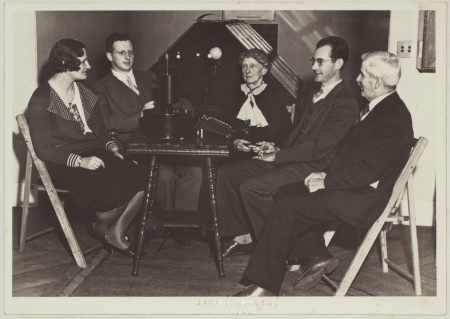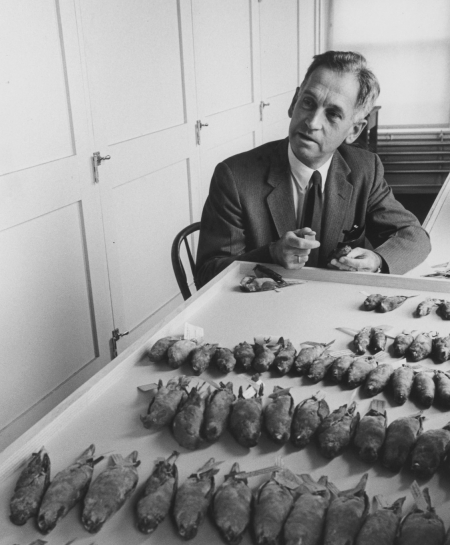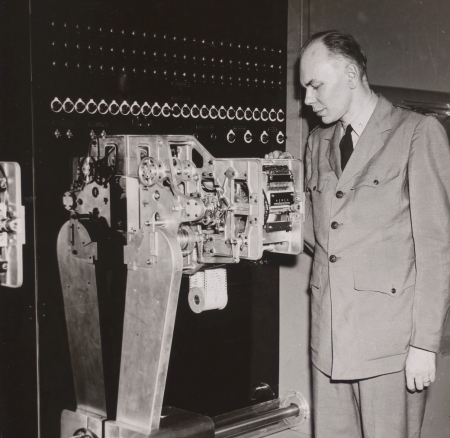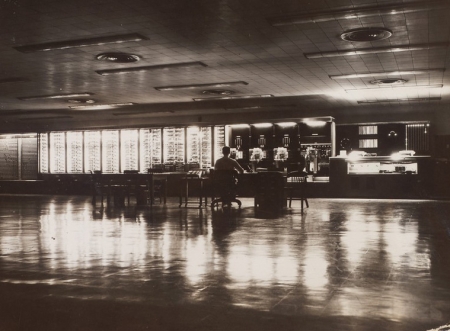
Harvard embraced scientific discovery and education at its inception. The Harvard University Archives’ collections related to science, technology, and the environment reflect a broad and varied wellspring of scientific and technological data, experimentation, invention, and theoretical and practical teaching.
The collections also provide for exploration of ethical and political dimensions of scientific practice and discovery, as well as the larger intellectual, cultural, social, and political effects of their outcomes.

Important stories are threaded through faculty personal archives, which contain research data and commentary, records of academic departments and laboratories, archives of offices that support research at Harvard, and even notebooks and other materials of Harvard students.
There is a reservoir of information in photographic and audio-visual resources, digital assets, and objects reflecting the history of scientific research and practice in the last four centuries.
The Archives is dedicated to preserving and highlighting the intellectual contributions of all those "doing science," as evidenced in the work of and records documenting female and male assistants and students working alongside men and women scientists across the centuries.
Natural Sciences Collections
Discover and engage in collections documenting study and research of the natural sciences at Harvard, as well as related and interdisciplinary work across the campus.
Collections range from 18th century manuscripts of astronomy lectures and early physics textbooks, to modern web pages documenting the wide-ranging fields that encompass these disciplines.

Modern faculty collections include the personal archives of several Nobel prize winners, such as chemist Robert Burns Woodward and biochemist George Wald.
Additionally, scholars are invited to explore collections of women engaged in research such as astronomers Margaret Mayall and Annie Jump Cannon, the first astronomer to systematically classify the stars.
Among these collections you can find information on the personal lives as well as the social justice and political causes that engaged Harvard scientists. This includes the detailed thoughts of John and Hannah Winthrop in the 18th century, to records relating to Frank Westheimer’s work to assist Jewish refugees in resettling in the U.S. after World War II.
Institutional records complement our faculty archives and provide the backdrop for the work of these luminaries.
The Archives holds vast documentation on the history of astronomy and astrophysics in America, including the extensive collection of records of the Harvard College Observatory, personal archives of faculty and administrators such as Fred Lawrence Whipple, and the records of many academic departments, such as the Department of Physics.
Mathematics, Engineering and Applied Science Collections
As early as the 1690s, mathematics—specifically geometry and algebra—were part of the Harvard curriculum.
Early records and personal archives of students and faculty lay out the course of study and how it was taught in the 17th and 18th centuries.

With the advent of scientific and technological discovery in the 19th and 20th centuries, Harvard's disciplines in these areas increased exponentially, many of which combined the traditional natural sciences with engineering and math to expand Harvard’s curriculum
Our collections in these areas range from early student notebooks and theses relating to engineering, geometry, and navigation, to 20th century research data and 21st century websites, to records on the establishment of Harvard’s newest School, the School of Engineering and Applied Sciences.
These collections contain a wealth of material from computer science pioneers like Anthony Oettinger and Grace Hopper, or those relating to the development of new fields of study, such as Arthur Casagrande’s work in soil science and engineering.
Also represented within these collections is the student work of alumni like Bill Gates and Paul Allen.
Environment, Earth Science and Sustainability Collections
Although environmental science as a discipline is associated with the 20th century, the Archives holds collections relating to early aspects of this area of study. Collections from early faculty contain recordings of meteorological data and observations about plant life in New England and other areas of the world from the 18th and 19th centuries.

In addition, several of our collections falling under the rubric of earth sciences contain important environmental data on changes in the arctic over the last century and, even, on the involvement of faculty in the study of environmental disasters, such as the effects of nuclear accidents.
Scientific Public Policy and Advancement Collections
Much of the scientific work and research at Harvard in the 20th and 21st centuries has had a direct impact on U.S. and global public policy as well as health and technology advancement.
Scientists at Harvard have served on science foundations and also participated in federally-supported scientific research—such as the Manhattan Project—or served on presidential advisory councils or commissions that enabled advances is areas such as aeronautics or explored the uses of atomic energy beyond the limits of Earth and its environment.
These issues can be explored using faculty archives such as those of George Kistiakowski, Paul Doty, and Kenneth Bainbridge.
Accessing These Materials
This guide details how to access materials held by the Harvard University Archives.